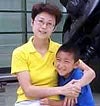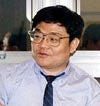Press Conference Co-sponsors
- New York Academy of Sciences
- The American Association for the Advancement of Science
- The American Sociological Association
- Human Rights Watch Academic Freedom Committee
New York Academy of Sciences
Founded in 1817, the New York Academy of Sciences is the third oldest scientific organization in America and one of New York City's oldest and most enduring cultural institutions. The Academy is an independent, nonprofit organization with more than 30,000 members in more than 160 countries united by a commitment to promoting science and technology and their essential roles in fostering social and economic development.
Created in 1978 to support and promote the human rights of scientists, physicians, engineers, and educators around the world, the Academy's Committee on the Human Rights of Scientists was credited by Andrei Sakharov and Chinese dissident Fang Lizhi with coordinating the international pressure that led to their releases.
Representing the NYAS Committee on Human Rights is Professor Joel Lebowitz, the George William Hill Professor of Mathematics and Physics at Rutgers University in New Jersey. In addition to his highly regarded and prize-winning scholarship in the fields of physics and mathematics, he has made great contributions to the human rights community. He has served as President and Vice-President of the New York Academy of Sciences and was the chairman of the organization's Human Rights Committee for over a decade. Prof. Lebowitz was also a member of the board of the International League for Human Rights from 1987-1988.
Visit the NY Academy of Sciences Web site.
The American Association for the Advancement of Science
The American Association for the Advancement of Science is the world's largest general science organization and publisher of the peer-reviewed journal Science. With more than 138,000 members and 275 affiliated societies, AAAS serves as an authoritative source for information on the latest developments in science and bridges gaps among scientists, policy-makers and the public to advance science and science education. Founded in Philadelphia in 1848, AAAS is among the oldest societies in America.
The AAAS Science and Human Rights Program was established in 1976 to give scientists a way to help their colleagues around the world whose human rights are threatened or violated. Mobilizing effective assistance to protect the human rights of scientists around the world remains central to its mission, as well as making the tools and knowledge of science available to benefit the field of human rights.
Representing the AAAS is Sage Russell, a Senior Program Associate with the Science and Human Rights Program. Her focus is on economic, social, and cultural rights. She coordinates and administers SHR's ongoing project in developing tools and resources for monitoring economic and social rights, as well as the Program's new project on the environmental components of existing human rights. She also works on appeals on behalf of individual scientists whose academic freedom has been infringed.
Visit the American Association for the Advancement of Science Web site.
The American Sociological Association
The American Sociological Association, founded in 1905, is a national membership organization dedicated to advancing sociology as a scientific discipline and profession serving the public good. With approximately 13,000 members, ASA encompasses sociologists who are faculty members at colleges and universities, researchers, practitioners, and students in the United States and also abroad. About 20 percent of the members work in government, business, or non-profit organizations. As the national organization for sociologists, the American Sociological Association is dedicated to advancing scientific knowledge, teaching, and training and the highest standards of ethical conduct. The ASA is well positioned to provide a unique set of services to its members and to promote the vitality, visibility, and diversity of the discipline. Working at the national and international levels, the Association aims to articulate policy and implement programs likely to have the broadest possible impact for sociology now and in the future.
Visit the American Sociological Association Web site.
Human Rights Watch Academic Freedom Committee
The academic freedom program aims to monitor, expose, and mobilize concerted action to challenge threats to academic freedom worldwide, and to foster greater scholarly and media attention to the critical role played by institutions of higher education in the promotion of human rights and the development and preservation of civil society. The program brings together the expertise of Human Rights Watch staff and the committed efforts of the academic leaders and prominent scholars who form the Human Rights Watch Academic Freedom Committee.
Visit the HRW Academic Freedom Committee Web site.
|
|
Letter to Jiang Zemin |
|
|
Leading Academics Protest Detentions HRW Press Release |
|
|
Other Petitions and Letters |
|
|
Biographies of the Detained Scholars |
|
|
Press Conference Co-sponsors |
|
|
Press Conference Speakers |
|
|
HRW Academic Freedom Program |
|
|
China: Human Rights Deteriorate HRW Special Focus |
  Dr. Gao Zhan, released  |
  Dr. Li Shaomin, released  |
  Dr. Xu Zerong, detained days  |